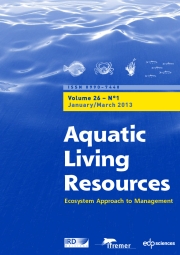Crossref Citations
This article has been cited by the following publications. This list is generated based on data provided by
Crossref.
Gardes, L
2000.
Induced spawning of red drum, Sciaenops ocellatus: use of multivariate and univariate analysis methods in the search for side effects of LH-RHa treatments and ovarian development state upon spawn quality.
Aquatic Living Resources,
Vol. 13,
Issue. 1,
p.
19.
Mathis, N
Feidt, C
and
Brun-Bellut, J
2003.
Influence of protein/energy ratio on carcass quality during the growing period of Eurasian perch (Perca fluviatilis).
Aquaculture,
Vol. 217,
Issue. 1-4,
p.
453.
2003.
Preface.
Marine and Freshwater Behaviour and Physiology,
Vol. 36,
Issue. 4,
p.
189.
Goulletquer, Philippe
Wolowicz, Maciej
Latala, Adam
Brown, Craig
and
Cragg, Simon
2004.
Application of a micro-respirometric volumetric method to respiratory measurements of larvae of the Pacific oysterCrassostrea gigas.
Aquatic Living Resources,
Vol. 17,
Issue. 2,
p.
195.
Rutten, Marc J.M
Bovenhuis, Henk
and
Komen, Hans
2004.
Modeling fillet traits based on body measurements in three Nile tilapia strains (Oreochromis niloticus L.).
Aquaculture,
Vol. 231,
Issue. 1-4,
p.
113.
Rutten, Marc J.M.
Bovenhuis, Henk
and
Komen, Hans
2005.
Genetic parameters for fillet traits and body measurements in Nile tilapia (Oreochromis niloticus L.).
Aquaculture,
Vol. 246,
Issue. 1-4,
p.
125.
TZIKAS, Zissis
AMBROSIADIS, Ioannis
SOULTOS, Nikolaos
and
GEORGAKIS, Spyridon
2007.
Seasonal size distribution, condition status and muscle yield of Mediterranean horse mackerel Trachurus mediterraneus from the North Aegean Sea, Greece.
Fisheries Science,
Vol. 73,
Issue. 2,
p.
453.
Kause, A.
Paananen, T.
Ritola, O.
and
Koskinen, H.
2007.
Direct and indirect selection of visceral lipid weight, fillet weight, and fillet percentage in a rainbow trout breeding program1.
Journal of Animal Science,
Vol. 85,
Issue. 12,
p.
3218.
Tzikas, Z.
Amvrosiadis, I.
Soultos, N.
and
Georgakis, Sp.
2007.
Seasonal variation in the chemical composition and microbiological condition of Mediterranean horse mackerel (Trachurus mediterraneus) muscle from the North Aegean Sea (Greece).
Food Control,
Vol. 18,
Issue. 3,
p.
251.
Kocour, Martin
Mauger, Stéphane
Rodina, Marek
Gela, David
Linhart, Otomar
and
Vandeputte, Marc
2007.
Heritability estimates for processing and quality traits in common carp (Cyprinus carpio L.) using a molecular pedigree.
Aquaculture,
Vol. 270,
Issue. 1-4,
p.
43.
Margeirsson, Sveinn
Jonsson, Guðmundur R.
Arason, Sigurjon
and
Thorkelsson, Gudjon
2007.
Influencing factors on yield, gaping, bruises and nematodes in cod (Gadus morhua) fillets.
Journal of Food Engineering,
Vol. 80,
Issue. 2,
p.
503.
Sang, Nguyen Van
Thomassen, Magny
Klemetsdal, Gunnar
and
Gjøen, Hans Magnus
2009.
Prediction of fillet weight, fillet yield, and fillet fat for live river catfish (Pangasianodon hypophthalmus).
Aquaculture,
Vol. 288,
Issue. 3-4,
p.
166.
Bauer, C.
and
Schlott, G.
2009.
Fillet yield and fat content in common carp (Cyprinus carpio) produced in three Austrian carp farms with different culture methodologies.
Journal of Applied Ichthyology,
Vol. 25,
Issue. 5,
p.
591.
COSTA, CORRADO
VANDEPUTTE, MARC
ANTONUCCI, FRANCESCA
BOGLIONE, CLARA
MENESATTI, PAOLO
CENADELLI, SILVIA
PARATI, KATIA
CHAVANNE, HERVÉ
and
CHATAIN, BÉATRICE
2010.
Genetic and environmental influences on shape variation in the European sea bass (Dicentrarchus labrax).
Biological Journal of the Linnean Society,
Vol. 101,
Issue. 2,
p.
427.
Galvão, Juliana Antunes
Margeirsson, Sveinn
Garate, Cecilia
Viðarsson, Jónas Rúnar
and
Oetterer, Marília
2010.
Traceability system in cod fishing.
Food Control,
Vol. 21,
Issue. 10,
p.
1360.
Sang, Nguyen Van
Klemetsdal, Gunnar
Ødegård, Jørgen
and
Gjøen, Hans Magnus
2012.
Genetic parameters of economically important traits recorded at a given age in striped catfish (Pangasianodon hypophthalmus).
Aquaculture,
Vol. 344-349,
Issue. ,
p.
82.
Peterman, Mark A.
and
Phelps, Ronald P.
2012.
Fillet Yields from Four Strains of Nile Tilapia (Oreochromis niloticus) and a Red Variety.
Journal of Applied Aquaculture,
Vol. 24,
Issue. 4,
p.
342.
Gjerde, Bjarne
Mengistu, Samuel Bekele
Ødegård, Jørgen
Johansen, Harry
and
Altamirano, Danilo Soza
2012.
Quantitative genetics of body weight, fillet weight and fillet yield in Nile tilapia (Oreochromis niloticus).
Aquaculture,
Vol. 342-343,
Issue. ,
p.
117.
Thodesen, Jørn
Rye, Morten
Wang, Yu-Xiang
Bentsen, Hans B.
and
Gjedrem, Trygve
2012.
Genetic improvement of tilapias in China: Genetic parameters and selection responses in fillet traits of Nile tilapia (Oreochromis niloticus) after six generations of multi-trait selection for growth and fillet yield.
Aquaculture,
Vol. 366-367,
Issue. ,
p.
67.
Akbulut, Bilal
2013.
Effect of Feeding Rate on Growth Performance, Food Utilization and Meat Yield of Sterlet (Acipenser ruthenus Linne, 1758).
Journal of FisheriesSciences.com,


